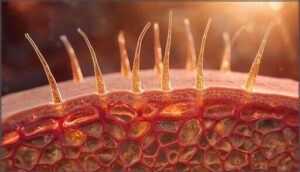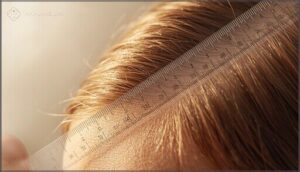This site is supported by our readers. We may earn a commission, at no cost to you, if you purchase through links.
Your hair doesn’t take vacations—it’s growing right now, this very second, even if you can’t see it happening. That relentless biological process adds up to roughly 4.9 millimeters over two weeks, though your personal growth rate might sprint ahead or lag behind depending on factors you control and many you don’t.
The gap between what you expect and what actually emerges from your scalp comes down to understanding how follicles operate under the influence of genetics, hormones, and lifestyle choices. Most people overestimate short-term growth while underestimating how consistent, evidence-based care compounds over months.
Knowing your baseline growth rate and the variables that accelerate or stall it gives you the clarity to set realistic expectations and take action where it actually counts.
Table Of Contents
- Key Takeaways
- How Much Does Hair Grow in 2 Weeks?
- What is The Hair Growth Cycle?
- What Factors Affect Two-Week Hair Growth?
- How to Calculate Your Two-Week Hair Growth
- Does Hair Type Impact Growth Rate?
- Can You Increase Hair Growth in Two Weeks?
- How Hair Health Influences Growth
- Common Myths About Short-Term Hair Growth
- Signs of Unusual Hair Growth or Loss
- When to Seek Professional Advice for Hair Concerns
- Frequently Asked Questions (FAQs)
- Conclusion
Key Takeaways
- Your hair grows approximately 4.9 millimeters (0.2 inches) over two weeks at a baseline rate of 0.35 millimeters per day, though genetics, hormones, age, and nutrition create measurable individual variations that trump any short-term intervention.
- The three-phase hair growth cycle—anagen (active growth lasting 2-8 years), catagen (2-3 week transition), and telogen (2-4 month rest)—determines your maximum length potential and daily shedding patterns, with 90% of follicles actively growing while 10-15% rest simultaneously.
- You can’t dramatically accelerate growth in two weeks, but optimizing scalp health through targeted nutrition (protein, iron, zinc, biotin, vitamin D), stress management, and protective care practices maximizes your follicles’ biological capacity and prevents breakage that sabotages length retention.
- Persistent slow growth under 2-3 millimeters biweekly, excessive shedding beyond 150 hairs daily, or scalp inflammation signals underlying medical conditions like thyroid disorders, nutrient deficiencies, or autoimmune alopecia that require professional dermatology assessment rather than DIY remedies.
How Much Does Hair Grow in 2 Weeks?
You’ve probably wondered how much your hair actually grows in just two weeks—and the answer might surprise you. The truth is, while there’s a general baseline for hair growth, your individual rate depends on several measurable factors.
Let’s break down the actual numbers, from daily increments to weekly averages, and explore why your growth rate might differ from someone else’s.
Average Hair Growth Measurements
Your hair’s liberation from follicle confinement follows precise growth patterns you can measure. Scalp health directly influences follicle care, determining how much length you gain daily. The hair growth cycle advances at roughly 0.35 millimeters per day—translating to approximately 2.45 millimeters weekly. Over two weeks, expect 4.9 millimeters of new growth, though your individual hair growth rate varies based on biological factors.
Understanding hair growth rates is essential for maintaining healthy hair.
Daily and Weekly Growth Rates
Breaking those growth patterns down gives you control over expectations. Your scalp’s daily rate produces approximately 0.35 millimeters of hair length—that’s measurable progress you can track. Here’s what the hair growth cycle delivers:
- Daily growth: 0.33-0.35 mm from your follicles
- Weekly increase: roughly 2.3-2.45 mm of new length
- Hair thickness impact: strands over 60 μm grow faster at 11.4 mm monthly
Understanding the hair growth rates is essential for managing your hair. Your hair growth rate operates on biological timelines, not wishful thinking.
Variability Among Individuals
While those weekly measurements provide a baseline, your genetic blueprint dictates whether you’ll exceed or fall short of 2.45 mm growth. Individual differences stem from multiple sources—hormonal influence can alter your anagen phase duration, nutrient deficiency slows follicular activity, and ethnic variations produce measurable disparities in growth rate.
| Factor | Impact on Growth | Variation Range |
|---|---|---|
| Age | Decreases with time | 0.5 to 0.3 inches/month |
| Ethnicity | Affects rate and texture | 70-100% of baseline |
| Hormones | Regulates cycle length | Anagen: 2-6 years |
Understanding these factors affecting hair growth enables you to recognize what’s controllable versus what’s hardwired into your biology.
What is The Hair Growth Cycle?
Your hair doesn’t grow continuously without stopping. It moves through distinct phases that determine when it grows, when it transitions, and when it rests.
Understanding these three phases helps you make sense of why your hair behaves the way it does over any two-week period.
Anagen Phase (Growth)
Your anagen phase determines how long your hair can grow. During this active stage of the hair growth cycle, roughly 90% of your scalp’s hair follicles are producing new strands through rapid cellular activity.
Hair proliferation occurs at about 0.3 to 0.44 mm daily, with anagen duration lasting 2-8 years depending on your genetics and age, directly influencing your maximum hair growth rate and overall growth patterns.
Catagen Phase (Transition)
Change marks everything in your hair growth cycle. The Catagen Phase represents a brief change period lasting just 2-3 weeks, where follicle regression begins through cellular apoptosis—programmed cell death that shrinks your hair follicle by approximately 50%.
During this follicle involution, your dermal papilla detaches, blood supply decreases, and club hair forms, preparing for eventual hair shedding without affecting your hair growth rate.
Telogen Phase (Rest)
Rest defines your follicles’ recovery period. The Telogen Phase spans 2-4 months, where your hair follicle enters complete dormancy—metabolic activity ceases, cellular division halts, and club hairs form at the root.
During this resting phase, 10-15% of scalp hairs remain anchored but inactive. You’ll naturally shed 50-100 telogen hairs daily as follicles prepare to re-enter the anagen phase, restarting your hair growth cycle.
What Factors Affect Two-Week Hair Growth?
Your hair doesn’t grow in a vacuum—it reacts to a complex interplay of internal and external forces that either fuel or stall follicular activity. While the average two-week growth hovers around 5 millimeters, your personal rate depends on factors you can’t change and some you can.
Understanding what drives or hinders your hair’s progress gives you the knowledge to work with your biology, not against it.
Genetics and Heredity
Your hair’s destiny is written in your DNA. Genetic mutations in genes like SOX2, FOXD1, and FGF5 control your hair growth cycle and determine whether you’ll grow 0.5 or 1.7 centimeters monthly. Here’s how inheritance factors shape your hair biology:
- Gene expression regulates follicle activity and growth phases
- Hereditary patterns cause 80-90% of hair loss cases
- Familial traits explain hair growth rate variations between individuals
Genetic differences trump any two-week intervention.
Hormonal Influence
Your body’s hormonal symphony orchestrates every hair follicle’s rhythm. Androgens can boost beard growth while paradoxically shrinking scalp follicles, triggering androgenetic alopecia. Estrogen prolongs the anagen phase during pregnancy, explaining postpartum shedding when levels drop. Thyroid hormones directly stimulate keratinocyte proliferation—hypothyroidism causes loss, hyperthyroidism produces thin strands.
Hormones orchestrate every follicle’s rhythm—androgens fuel beard growth yet trigger scalp loss, while estrogen prolongs growth phases and thyroid function directly controls keratin production
| Hormone | Effect on Hair Growth |
|---|---|
| Androgens | Stimulate body hair; may inhibit scalp follicles |
| Estrogen | Prolongs growth phase; reduces shedding |
| Thyroid | Regulates follicle activity and keratin production |
The menstrual cycle’s hormonal fluctuations subtly alter your hair growth rate across two-week intervals.
Nutrition and Diet
Your follicles demand a precise nutrient balance to manufacture keratin and sustain hair growth. Vitamin deficiency in D, iron, or C slows regeneration cycles, while protein intake fuels cellular repair. Hair minerals like zinc and biotin activate follicle metabolism.
Dietary supplements can correct deficiencies, but over-supplementation—especially selenium or vitamin A—paradoxically triggers loss. Nutrition directly determines your two-week growth trajectory and overall hair health.
Age and Sex
Between 15 and 30, your follicles hit peak velocity—age factors directly throttle growth patterns as cellular turnover slows. Sex differences matter too: male hair usually grows faster due to hormone effects, specifically androgens that boost follicle activity. After 30, genetic influence becomes more visible as growth rate declines.
- Peak hair growth cycle performance occurs during your late teens through twenties
- Androgens create measurable sex differences in hair growth rate and thickness
- Age factors progressively reduce follicle efficiency, impacting overall hair health
How to Calculate Your Two-Week Hair Growth
You don’t need fancy equipment or lab-grade precision to measure your hair growth over two weeks. A simple ruler and consistent technique will give you the data you need to track what’s actually happening on your scalp.
Here’s how to take control of measuring your progress accurately.
Using Average Growth Rates
Generally, you’ll multiply 0.35 mm—your daily hair growth rate—by 14 days to estimate two-week progress, yielding roughly 4.9 mm or about 0.2 inches. This calculation assumes healthy follicle health and an active anagen phase within your hair growth cycle.
Daily growth tracking reveals growth rate variance based on scalp condition and individual hair cycle phases. Understanding your baseline hair growth measurement enables you to spot deviations and take control of your hair’s trajectory.
Tools and Methods for Measuring
You can’t rely on guesswork when precision matters. Trichoscopy tools with 10x to 70x magnification reveal hair follicle activity, while digital imaging software like HairMetrix delivers automated hair growth measurement with up to 95% accuracy.
Microscopic analysis tracks diameter changes, and hair mapping documents density shifts across your scalp. These methods decode your hair growth cycle, giving you objective data to challenge assumptions and reclaim control over your hair growth rate.
Tracking Progress Over Time
Once you have your measurement tools, photographic evidence becomes your most powerful asset. Set up standardized photography—same lighting, angle, and background every time. Take shots at 3-month intervals; that’s when your hair growth cycle reveals meaningful changes. Short-term snapshots won’t cut it.
Use time-lapse documentation and hair analysis software to track progress monitoring across growth stages, turning raw data into actionable hair growth tips that challenge the status quo.
Does Hair Type Impact Growth Rate?
You might assume all hair grows at the same rate, but your hair’s texture, ethnic background, and even its location on your body can influence how quickly it lengthens.
These variations don’t change the basic biology of follicles, yet they produce measurable differences in growth patterns.
Understanding these factors helps you set realistic expectations for your own hair’s two-week progress.
Differences by Hair Texture
Your hair texture shapes how growth appears, not necessarily the actual hair growth rate. Straight hair follicles produce strands that elongate visibly, while curl patterns in wavy, curly, and coily textures create shrinkage—masking length gains during the hair growth cycle.
Follicle density and hair porosity also vary by texture, influencing moisture retention and breakage susceptibility, which ultimately affect how much growth you’ll see.
Ethnic Variations in Growth
Genetic factors determine hair growth rates across ethnicities. Asian scalp hair grows fastest at 1.4 cm monthly, while African hair averages 0.9 cm due to follicle size and shape differences.
Your ethnic background shapes follicle morphology: round follicles produce straight strands with rapid elongation, while oval follicles create spiral growth patterns that affect visible length during the hair growth cycle, regardless of actual follicle activity.
Scalp Vs. Body Hair Growth
Your scalp hair follicle operates differently than body hair due to distinct growth patterns and hormone effects. Scalp hair grows 0.35 mm daily through extended anagen phases lasting years, while body hair cycles complete within months, limiting length.
Androgens stimulate body hair but thin scalp hair in sensitive individuals. These differences in hair growth rate and hair growth cycle depend on follicle structure and scalp health, not growth speed alone.
Can You Increase Hair Growth in Two Weeks?
You can’t dramatically speed up your hair’s biological clock in just two weeks—growth remains anchored around that 0.35 millimeters per day. However, you can enhance the conditions your follicles need to hit their maximum potential during this timeframe.
Let’s look at three evidence-based approaches that support your hair’s natural growth capacity.
Nutritional Strategies
You won’t transform your hair overnight, but targeting nutrient deficiency can accelerate your hair growth rate during critical hair growth stages. Protein supplements, vitamin balance, and mineral intake lay the foundation for sturdy hair health—think of these as fuel for your follicles during the anagen phase.
- Consume protein-rich foods like fish, eggs, and legumes to support keratin synthesis and prevent brittle strands
- Secure adequate iron intake through lean meats or fortified cereals to enhance oxygen delivery to follicles
- Include zinc sources like oysters and pumpkin seeds to inhibit follicle regression
- Prioritize B-vitamins, especially biotin and folate, for cellular rejuvenation in actively growing follicles
- Maintain vitamin D levels through sunlight exposure or supplementation to promote anagen phase activity
Healthy eating with targeted hair growth supplements tackles deficiencies that compromise your hair’s potential.
Scalp Massage and Stimulation
Can mechanical stimulation truly awaken dormant follicles? Regular massage techniques boost blood circulation to your dermal papilla by up to 120%, delivering oxygen and nutrients that fuel follicle stimulation.
Daily 4-minute sessions targeting different scalp sections activate hair follicle structure, potentially increasing thickness by 0.007 mm over weeks. This scalp care approach fosters hair growth promotion through consistent follicle engagement.
Supplements and Topical Products
Can topical formulations truly accelerate your follicle timeline? Minoxidil results demonstrate a 15-20% increased hair count after 24 weeks through vasodilation and a prolonged anagen phase.
Biotin benefits keratin synthesis when you’re deficient, while caffeine effects include DHT inhibition and enhanced circulation.
Nutrient enhancement through zinc and iron aids follicle stimulation, though hair regeneration from hair growth supplements and hair growth oils requires consistent application beyond two weeks.
How Hair Health Influences Growth
Your hair’s overall health doesn’t just affect how it looks—it directly controls how fast it can grow. When your body lacks essential nutrients, experiences chronic stress, or your strands face constant damage, growth slows down or stops entirely.
Let’s break down the three key health factors that determine whether your hair reaches its full growth potential in any two-week period.
Protein and Nutrient Deficiencies
Your hair can’t build itself without the right raw materials. Protein intake fuels keratin production, while nutrient balance determines follicle strength and hair development. Here’s what deficiency symptoms look like:
- Protein deficiency triggers premature telogen phase entry, causing excessive shedding and brittle strands.
- Iron deficiency impairs oxygen delivery to follicles, slowing hair growth rate markedly.
- Zinc deficiency weakens follicle structure, increasing hair loss risk.
- Biotin and Vitamin D deficiencies compromise keratin synthesis and follicle integrity.
Dietary planning and hair supplements can correct these imbalances, restoring hair health and optimizing hair growth stages.
Effects of Stress on Growth
Chronic stress doesn’t just frazzle your nerves—it hijacks your hair growth cycle. Elevated stress hormones like cortisol force hair follicles into a premature telogen phase, triggering telogen effluvium and noticeable hair loss within two to four months.
Your hair growth rate plummets as follicles stall. Fortunately, effective stress management reverses this cortisol impact in 90-95% of cases, restoring normal growth within six to twelve months.
Protective Hair Care Practices
Beyond managing stress, your daily Hair Care routines determine whether follicles thrive or falter. Gentle Hair Routines paired with Hair Oil Treatments reduce breakage by roughly 30%. Scalp Massage Techniques boost blood flow, nudging growth rates up 10-15%.
Hair Breakage Prevention through heat protectants and loose styling cuts damage in half. These Healthy Hair Habits—Scalp Care and Maintenance, protective styling, strategic Hair Care Tips—directly influence Hair Health and maximize Hair Growth potential.
Common Myths About Short-Term Hair Growth
You’ve probably heard all kinds of advice about making your hair grow faster, and most of it doesn’t hold up under scrutiny. These myths spread quickly because they sound logical, but the science tells a different story.
Let’s break down three persistent beliefs about short-term hair growth and separate fact from fiction.
Does Cutting Hair Make It Grow Faster?
Why does this myth refuse to die? Trimming your hair doesn’t accelerate your Hair Growth Rate—growth happens at the follicle, not the dead keratin you’re snipping. Your Anagen Phase and Growth Patterns remain unchanged regardless of Cutting Techniques. Hair Trimming benefits Follicle Health by preventing breakage, helping you retain length, but it won’t speed Hair Regrowth.
- Hair growth originates deep in your scalp’s follicles, beyond any scissors’ reach
- The Hair Growth Cycle operates independently of whatever’s happening at your ends
- Regular trims prevent split ends from traveling upward and sabotaging length retention
- Strategic Hair Care Tips focus on nourishing follicles, not manipulating hair shafts
- Your growth rate stays constant—trimming just keeps what you’re growing healthier
Impact of Frequent Washing or Styling
Overwashing and daily heat styling won’t slow your Hair Growth Rate, but they’ll sabotage Hair Health in ways that undermine your length goals.
Washing 5-6 times weekly strips natural oils, damaging cuticles and increasing Hair Porosity. Heat styling above 200°C decreases tensile strength by 20-30%, creating Breakage Patterns that cost you visible length.
Your Hair Growth Cycle continues unfazed—your Hair Care Routine determines what survives.
Home Remedies and Their Effectiveness
Natural oils like coconut or castor won’t accelerate your hair growth rate—they improve scalp health and reduce breakage, not follicle speed. Rosemary oil shows promise (some studies report increased hair count after six months), while herbal extracts and scalp massage stimulate circulation without changing your hair growth cycle.
Hair supplements and hair growth promotion claims rarely deliver measurable two-week results despite widespread hair care tips suggesting otherwise.
Signs of Unusual Hair Growth or Loss
Your hair won’t always follow the textbook timeline, and that’s when you need to pay attention. Sometimes what you’re seeing in the mirror or on your pillowcase signals a real shift in your follicle health that deserves investigation.
Recognizing the difference between normal variation and genuine concern gives you the power to act before small issues become bigger problems.
Normal Vs. Excessive Shedding
Your scalp sheds 50-100 hairs daily—that’s normal, part of the hair growth cycle’s natural rhythm. But when shedding jumps to 300 or more hairs per day, you’re looking at excessive shedding, often triggered by stress, hormonal shifts, or nutritional gaps.
Here’s what separates normal from problematic:
- Daily loss under 100 hairs indicates healthy hair cycle function
- Sudden increases 2-3 months post-stressor signal telogen effluvium
- Patchy loss suggests autoimmune hair loss causes like alopecia areata
- Persistent thinning over months warrants scalp health evaluation
- Iron or biotin deficiencies commonly drive excessive shedding patterns
When Growth is Slower Than Expected
If your hair’s barely budging past 2-3 millimeters in two weeks—well below the standard 4-5 millimeters—you’re witnessing disrupted hair growth stages. Hormonal imbalance, autoimmune diseases, nutrient deficiency, or scalp inflammation can strangle your hair growth rate. Hair follicle damage from chronic conditions redirects your hair growth cycle into extended telogen, halting progress and demanding intervention.
| Condition | Growth Impact | Recovery Timeline |
|---|---|---|
| Thyroid disorders | 33-50% experience shedding | 6-12 months post-treatment |
| Iron deficiency | Up to 59% with hair loss | 3-6 months with supplementation |
| Alopecia areata | Patchy growth disruption | Variable, 6+ months |
| Telogen effluvium | Diffuse thinning, slowed growth | 6-12 months after trigger removal |
| Scalp psoriasis | Inflammation halts follicle function | Weeks to months with treatment |
Understanding factors influencing hair growth and maintaining hair health puts control back in your hands—but persistent slowdowns need professional assessment.
Indicators of Scalp or Follicle Issues
Your scalp and follicles send warning signals you shouldn’t ignore. Watch for these indicators of follicle damage or scalp conditions disrupting your hair growth cycle:
- Persistent redness, itching, or flaking—scalp inflammation affecting up to 40-80% of psoriasis patients
- Black dots or irregular hair shaft abnormalities—seen in 95% of alopecia cases
- Painful bumps or pustules—folliculitis causing permanent follicle health damage
- Unusual shedding patterns or bald patches—compromising your hair growth rate and scalp health
When to Seek Professional Advice for Hair Concerns
You don’t need to tough it out alone when your hair refuses to cooperate.
Sometimes what looks like a simple growth slowdown actually signals something deeper that needs professional attention. Here’s when it’s time to stop guessing and start getting real answers from someone who knows what they’re looking at.
Persistent Slow Growth or Hair Loss
If you’re shedding more than 150 hairs daily or noticing your growth patterns stalling for months, don’t wait—your scalp health demands attention.
Persistent slow hair growth rate or progressive hair loss may signal follicle damage, hormonal disruptions, or nutritional deficiencies disrupting your hair growth cycle.
Understanding hair loss causes enables you to pursue targeted regrowth strategies and reclaim control over your hair health before the damage becomes irreversible.
Medical Conditions Affecting Hair
When underlying medical conditions disrupt your follicles, hair loss causes extend beyond surface-level solutions—alopecia treatment requires addressing the root pathology. Three conditions demand immediate dermatology or trichology intervention:
- Androgenetic alopecia affects 80% of men by age 70, with DHT-driven follicle miniaturization requiring targeted pharmaceutical intervention.
- Autoimmune disorders like alopecia areata impact 2% of the population, where immune cells attack follicles.
- Thyroid impact and nutrient deficiency disrupt hair growth cycles, with 30-50% of thyroid patients experiencing hair loss.
Understanding hair health means recognizing when systemic disease—not styling habits—drives your shedding.
Consulting Dermatologists or Trichologists
Recognizing when you need expert intervention separates proactive care from guesswork. Dermatologist role centers on medical diagnosis—biopsies, blood panels, and pharmaceutical treatment for conditions like androgenetic alopecia.
Trichologist services focus on non-medical scalp analysis and lifestyle strategies.
Both specialists evaluate hair growth rate and hair health through sophisticated dermatology and trichology techniques, giving you clarity when DIY approaches fail.
Frequently Asked Questions (FAQs)
Does hair grow faster in certain seasons?
Turns out, your follicles do dance to nature’s rhythm.
Research shows hair growth increases by approximately 10% during summer months, driven by hormonal influences, photoperiod effects, and circadian rhythms affecting hair growth cycle phases.
Can stress cause hair to stop growing temporarily?
Yes, stress can temporarily halt hair growth by pushing follicles into telogen phase prematurely. Elevated cortisol impacts follicle health, triggering hair shedding usually 2-3 months after the stressful event occurs.
How does sleep quality affect hair growth rate?
Poor sleep patterns disrupt hair follicles by elevating cortisol impact and reducing growth hormones and melatonin levels, slowing hair growth rate and impairing the cellular metabolism essential for hair health and wellness.
Can medications slow down or accelerate hair growth?
Certain medications accelerate hair growth. Minoxidil stimulates follicles through vasodilation, finasteride blocks DHT to prevent miniaturization, and JAK inhibitors reverse autoimmune attacks.
Others, like chemotherapy agents, temporarily halt growth by disrupting cellular division.
Conclusion
Picture your follicles as miniature factories running on biological clockwork—pause the process, and you’d see exactly how much hair grows in 2 weeks: roughly 5 millimeters of protein engineered strand by strand.
That number won’t budge with wishful thinking, but you control the quality of what emerges. Feed your scalp the nutrients it demands, protect what you’ve already grown, and measure progress in months—not days—to see real transformation take root.
- https://www.sciencefocus.com/the-human-body/how-fast-does-hair-grow
- https://www.medicalnewstoday.com/articles/326764
- https://en.wikipedia.org/wiki/Human_hair_growth
- https://www.reddit.com/r/HaircareScience/comments/18lziob/how_fast_does_your_hair_grow_appoximately
- https://www.sciencedirect.com/topics/medicine-and-dentistry/hair-growth















